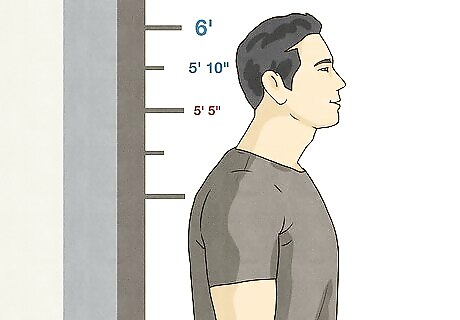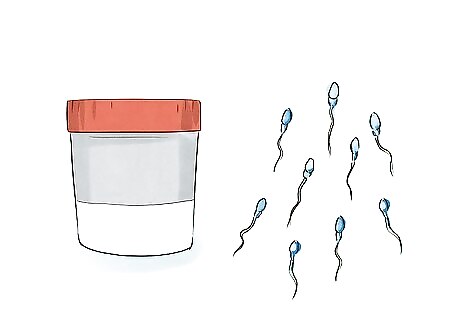
views
Pre-qualifying for Sperm Donation

Be younger than 40-45. Although sperm banks and fertility clinics all have slightly different policies in terms of sperm donor qualifications, many clinics require that you be younger than 40 years old. Some males may produce completely healthy sperm beyond the ages of 40-45, but research shows that sperm quality often goes down at this point. The age preference for some facilities can be as low as 35 years. At the other end of the spectrum, the minimum age requirement is usually either 19 or 20 years. Male sperm donors are usually paid between $40-100 USD per viable sample. In some countries, the age requirements might be capped at 45.

Apply only if you're at least average height. In addition to age, there are height restrictions of who can donate sperm in the U.S. and many other countries. Shorter people don't have more issues with their sperm compared to tall people, but the recipients of the sperm often request taller donors, so the sperm banks and fertility clinics comply with their wishes. Some facilities require that their sperm donors be at least 5’8” (1.7 m), although preference might be given to individuals who are at least 6’ (1.8 m). A person’s height can mostly be attributed to genetics. Taller children tend to fit in better among their peers (assuming they're not giants) and eventually have a higher probability of success with dating, marriage and mating.

Realize that education often matters. Obviously many people who don't attend university or college are highly intelligent or even geniuses, but many banks and fertility clinics may require proof of enrollment or completion of post-secondary education, such as a college degree. In fact, some sperm banks only accept donors who are graduates of Ivy League schools and then market that information to justify their higher costs. Regardless, if you are not formally educated in some capacity, you may have a lower chance of being accepted as a sperm donor.

Be prepared to make a commitment. Almost no sperm banks or fertility clinics accept donors who have the intent of going through the process only once. Instead, most want a commitment in terms of frequency of visits (weekly or twice-weekly) and time (1-year contracts are common). Most companies feel that commitment to their timetables represents stability, plus they have the opportunity to monitor and compare sperm samples for quality and evidence of poor health or bad lifestyle changes. For example, blood and sperm samples are routinely screened for illicit drug use, which can alter and damage sperm. All sorts of hair and eye colors are encouraged, with the possible exception of red hair at some clinics. It appears that people who buy donated sperm prefer red hair the least.

Be healthy. Sperm banks and fertility clinics screen for health issues and sexual preference, or at least sexual practices. Males who have hereditary diseases are excluded, as are those with chronic debilitating diseases (such as diabetes, cancer or chronic fatigue), due to the negative impact on sperm production and motility. You also cannot have any exposure to the following infectious diseases: HIV, hepatitis B and C, HTLV, syphilis, and chlamydia. Some common hereditary diseases include cystic fibrosis and sickle cell disease. Blood samples are taken for examination before acceptance. Not all of the sperm within a sample of ejaculate will survive the freezing process at sperm banks and fertility clinics. Because of this, the sperm health of sperm donors needs to be better than average.
Donating Sperm

Pass the screening and interview process first. After meeting the initial requirements of age, height, health, and sexual practices, sperm donor candidates then progress to the screening and interview process in order to substantiate their claims and get a better feel for their personality and willingness to make a commitment. If you haven't already filled one out, you'll need to complete a thorough medical history questionnaire of not just your own, but also your immediate family. The questionnaire is followed sometimes by a personal interview and then blood and semen samples. If accepted, a legally binding contract has to be signed. Ask the sperm donation bank if certain mental health conditions could raise potential issues.

Make an effort to provide a good sample. Because your sperm count, motility and overall morphology is a crucial aspect of being accepted as a sperm donor, take it seriously and try to give the best sample you can. Donors are typically asked to abstain from ejaculation (from sex or masturbation) for at least 2 days (sometimes up to 5 days) before giving a sperm sample in order to get the highest counts possible. Prior to giving a sperm sample, get a good night's sleep, avoid alcohol and cigarette smoke, drink plenty of water and eat a nutritious meal. Supplements that may help improve the health of your sperm include zinc, selenium, folic acid, vitamin E, vitamin C, coQ10, and L-carnitine. Taking a combination of vitamin E, vitamin C, and coQ10 may be especially helpful for increasing your sperm count. Some sperm banks and fertility clinics may ask for weekly sperm deposits.

Learn some tips to ejaculate while in clinical settings. To ensure that it's your sperm sample, most sperm banks and fertility clinics require you to ejaculate while on their premises. You will be in a private room alone to provide your sample. Clinical settings are not known for their sexual atmosphere, so you'll have to learn to control your feelings of nervousness / awkwardness and rely more on your imagination. Some facilities provide pornographic material to increase arousal. Furthermore, you can't use any lubricants (even saliva or water) to masturbate due to their potentially negative effects on sperm health. As such, rely on vivid sexual imagery in your own head and consider bringing to the clinic a device that stimulates your genitals in some capacity, such as vibrator. After the initial STD screening, sperm samples are quarantined and typically frozen for 6 months. Then, before use, the sperm sample is tested again to ensure safety from pathogens. Sperm banks tend to be very protective of its donors' rights and confidentiality, and they have no legal rights or responsibilities for kids conceived from their sperm.

















Comments
0 comment